 Petzlover
Petzlover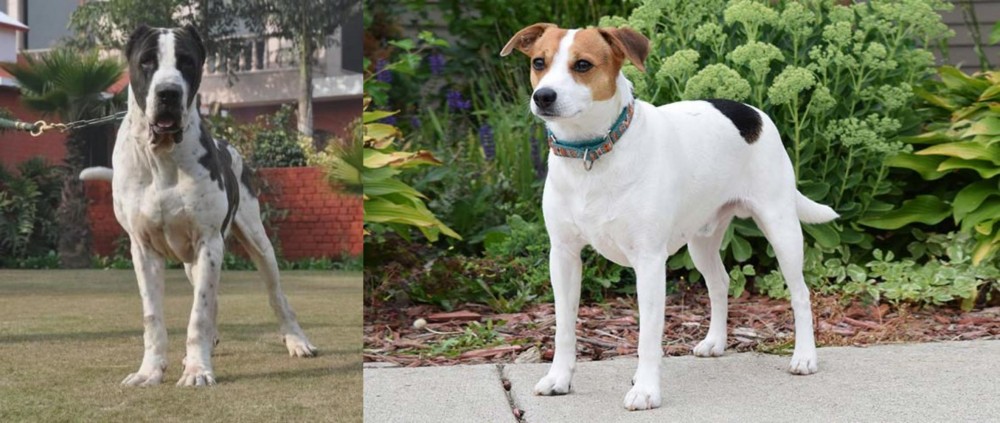 Bully Kutta is originated from India but Danish Swedish Farmdog is originated from Denmark. Bully Kutta may grow 52 cm / 21 inches higher than Danish Swedish Farmdog. Bully Kutta may weigh 78 kg / 172 pounds more than Danish Swedish Farmdog. Bully Kutta may live 3 years less than Danish Swedish Farmdog. Bully Kutta may have more litter size than Danish Swedish Farmdog. Both Bully Kutta and Danish Swedish Farmdog requires Low Maintenance.
Bully Kutta is originated from India but Danish Swedish Farmdog is originated from Denmark. Bully Kutta may grow 52 cm / 21 inches higher than Danish Swedish Farmdog. Bully Kutta may weigh 78 kg / 172 pounds more than Danish Swedish Farmdog. Bully Kutta may live 3 years less than Danish Swedish Farmdog. Bully Kutta may have more litter size than Danish Swedish Farmdog. Both Bully Kutta and Danish Swedish Farmdog requires Low Maintenance.
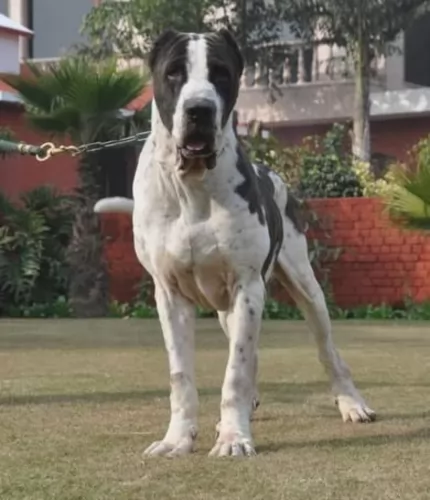 This well built, powerful dog breed is also known as Indian Alangu Mastiff or Pakistani Mastiff. These dogs come from the Punjab and Sindh region of the Indian subcontinent. It is believed that mastiff dogs came with British soldiers during the British invasion, however English Mastiffs, Bulldogs, Bull Terriers and Great Danes are seen as potential ancestors of this large dog.
This well built, powerful dog breed is also known as Indian Alangu Mastiff or Pakistani Mastiff. These dogs come from the Punjab and Sindh region of the Indian subcontinent. It is believed that mastiff dogs came with British soldiers during the British invasion, however English Mastiffs, Bulldogs, Bull Terriers and Great Danes are seen as potential ancestors of this large dog.
There are disputes about the country of origin of this breed, and some people claim that the dog comes from India, while others say it comes from Pakistan. Certainly in Pakistan these dogs are still used for fighting.
 The Danish Swedish Farmdog has over the centuries been a versatile dog, working on farms. The history of this dog goes way back to the 1700s, being found in Denmark and Sweden where they originated.
The Danish Swedish Farmdog has over the centuries been a versatile dog, working on farms. The history of this dog goes way back to the 1700s, being found in Denmark and Sweden where they originated.
Today these dogs are also found in other countries. As life changed, the dog’s functions on the farm became less and the dog seemed to disappear somewhat. Both the Danish and Swedish Kennel Clubs worked together to bring back the breed, resulting in the first breed standard in 1987.
The Danish-Swedish Farmdog was also recorded in the American Kennel Club Foundation Stock Services in 2011. Today, most of these dogs are owned as family or companion dogs.
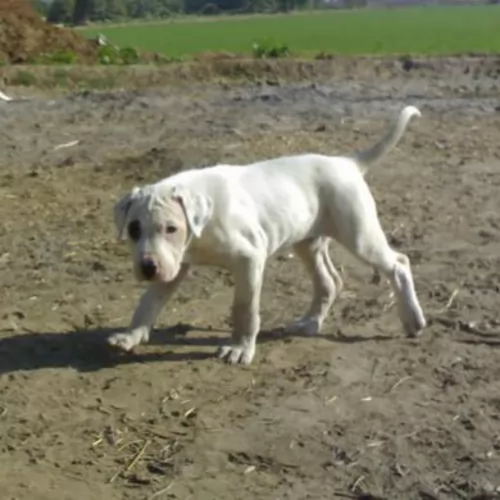 The Bully Kutta is a big, heavy, muscular dog, standing at roughly 81 – 89cm and weighing in at 70–90kg. He isn’t particularly good with children or with other pets simply because the dog is aggressive by nature. If you do opt for this large breed, you’re going to need a large garden and he is going to require a lot of exercise.
The Bully Kutta is a big, heavy, muscular dog, standing at roughly 81 – 89cm and weighing in at 70–90kg. He isn’t particularly good with children or with other pets simply because the dog is aggressive by nature. If you do opt for this large breed, you’re going to need a large garden and he is going to require a lot of exercise.
This is a dog breed that is going to require socialization and training if you want him to be obedient and calm, as he is inclined to be a dominating breed. He’s an intelligent dog and when well trained, he makes a splendid pet with firm, fair owners.
The Bully Kutta has a large, broad head which is supported by a thick well-muscled neck. The skin around his lower jaw is loose. The ears are short, set high and are mostly cropped, but other times they are left to flop over. The tail is sometimes docked but these days mostly left long and tapered.
He has a short smooth coat and is essentially white in color although the coat can also be fawn, brown, black or brindle.
 Nobody could be blamed for thinking that the Danish Swedish Farmdog is a Fox Terrier, because he looks very similar. He also has a short, smooth coat which is odor-free and he is a wonderfully low maintenance breed. The coat does however shed throughout the year.
Nobody could be blamed for thinking that the Danish Swedish Farmdog is a Fox Terrier, because he looks very similar. He also has a short, smooth coat which is odor-free and he is a wonderfully low maintenance breed. The coat does however shed throughout the year.
The coat’s main color is white with patches of black, fawn or chocolate brown. He can also be tri-colored. He is a small to medium sized dog with a compact body, standing between 32 - 37 cm and weighing about 7 – 12kg. He has a deep chest while the head is lean, small and triangular shaped. The ears are semi erect or they can be floppy while the tail is long.
The Danish Swedish Farmdog is not only intelligent, but he has other excellent characteristics that make him such a splendid pet. He isn’t aggressive, he is playful, loving, loyal, social and energetic.
He therefore makes an exceptional pet. He is an amusing pet who will prove to be entertaining too. He loves being part of all the family’s activities and gets on well with children and pets in the home.
You want to be sure that you provide him with exercise and games so that he doesn’t become bored, frustrated and destructive. After all, he is a breed that is used to be busy and he won’t do well with a family who puts him in the back yard and just leaves him.
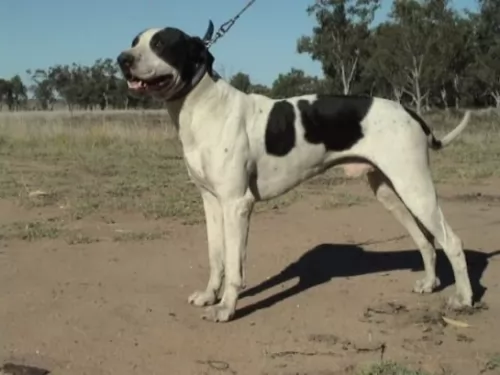 The Bully Kutta is a powerful, imposing dog and they have been nicknamed the ‘Beast from the East’. Unfortunately it is this dog’s thick bones, his looks and his strength that have him used for cruel dog fighting in Pakistan.
The Bully Kutta is a powerful, imposing dog and they have been nicknamed the ‘Beast from the East’. Unfortunately it is this dog’s thick bones, his looks and his strength that have him used for cruel dog fighting in Pakistan.
When not used for fighting, he makes a loyal, devoted companion for the owner who ensures proper socialization and training. Well raised Bully Kuttas are then good with children, being loving, protective and playful.
One just hopes that the future of this giant dog breed is brighter, and that he will be looked upon as more of a companion that just a dog-fighting object to bring in money for his owner.
 The Danish Swedish Farmdog has got everything going for him that makes him such a wonderful pet to have. He fits well into city- or country life, although wherever you live, you’ll need to ensure he is well exercised.
The Danish Swedish Farmdog has got everything going for him that makes him such a wonderful pet to have. He fits well into city- or country life, although wherever you live, you’ll need to ensure he is well exercised.
He is a child-friendly- and pet-friendly pet and he also happens to be low maintenance. You just need to brush him twice a week. You aren't likely to spend much on vet's fees with him either.In exchange for his love and devotion, make sure that you give every everything he needs to ensure his health and happiness.
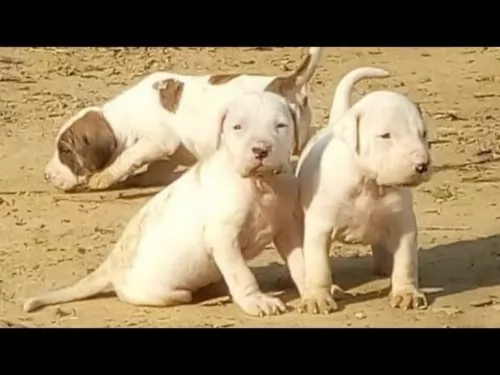 Your Bully Kutta is generally a healthy dog and not often affected by hereditary diseases, but with giant breeds such as this you will have to look out for diseases common to large dogs.
Your Bully Kutta is generally a healthy dog and not often affected by hereditary diseases, but with giant breeds such as this you will have to look out for diseases common to large dogs.
Typical illnesses to watch out for will include hip dysplasia, arthritis, skin allergies and bloat.
This is an inherited condition where the hip joint is improperly formed. For your Bully Kutta it causes wear and tear as well as stiffness in the hips and your dog battles to rise after lying down.
Arthritis in your dog can be managed but it can cause a lot of discomfort for him. This inflammation of the joints can cause pain and stiffness. It is more often seen in older dogs. It can also start at an early age because of problems with bone and joint development and abnormal rubbing within the joint.
Today there are a number of therapy options that can bring some kind of relief to your dog.
 Danish-Swedish Farmdogs have a lifespan ranging from 11 to 15 years. They are hardy dogs, not suffering from any breed specific genetic issues.
Danish-Swedish Farmdogs have a lifespan ranging from 11 to 15 years. They are hardy dogs, not suffering from any breed specific genetic issues.
However, it pays off to know of some of the common dog illnesses there are. If you provide your dog with high quality, nutritious food, good exercise and plenty of love and care, he can reach 15 years of age. Some of the more common dog illnesses to look out for -
It is always a good idea to have this testing for your dog. In fact, hip testing can spare you a great deal of anguish later on with your pet.
Hip dysplasia is a common skeletal disorder in dogs and although it is more prevalent in large dogs, smaller dogs can also get it.
You’ll notice your pet running with a strange gait and sometimes when he lies down, he’ll battle to get up again.
Recognizing the clinical signs of hip dysplasia is important to spare your dog a whole lot of pain, discomfort and even lameness.
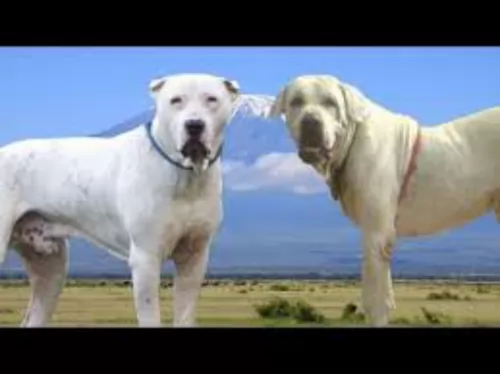 The short coat is low maintenance and as a moderate shedder too, all that is required really is to give your Bully Kutta a good brush twice a week to keep the coat in good condition.
The short coat is low maintenance and as a moderate shedder too, all that is required really is to give your Bully Kutta a good brush twice a week to keep the coat in good condition.
Brush his teeth 2 or 3 times a week with special canine-toothpaste and toothbrush to prevent plaque build-up. He’s a drooler too, so you will need to wipe his face and maybe your clothes of slobber from time to time.
This strong, muscular dog of yours will require an excellent diet. It’s always wonderful if you can give him home-made food such as vegetables, rice and meat. These days you get excellent commercially manufactured food for dogs, and your vet can advise you on the best food for a large, active dog such as the Buly Kutta.
Raw meat is absolutely essential for your dog from time to time and will ensure that his coat doesn’t become dull and with bald spots. Remember, that before dogs were domesticated they used to live on raw meat, so see that he gets some raw meat to prevent skin disorders. Make sure your large pet has a constant supply of fresh, cool water.
Bully Kuttas are going to need a walk every day in the form of exercise. If he is socialized you can take him into the park for ball games. He is a dog that will require plenty of space.
 The Danish Swedish Farmdog isn’t going to be requiring too much grooming. He has a short, smooth coat which actually repels dirt.
The Danish Swedish Farmdog isn’t going to be requiring too much grooming. He has a short, smooth coat which actually repels dirt.
Because his coat is odor-free, he certainly can get by without bathing. This is good news, as bathing a dog strips the skin of its natural oils. You can always just wipe his coat down with a damp cloth to rid it of dust and give his coat a good brushing twice a week to remove it of loose hairs.
It is always a good idea to check your pet’s ears to see that they remain free of debris and wax. There are ways and means to do this, and if you’re not sure how, your vet or doggy parlor can explain the process.
Check his nails to ensure they don’t get too long. This is prone to happen when your pet runs constantly on grass and doesn’t come into contact with a hard surface which files the nails down naturally.
Also, dental care is most important, and you need to brush your pet’s teeth 2 or 3 times a week with special toothpaste and toothbrush designed for dogs. Bad teeth don’t only affect the mouth of the dog, they can be detrimental to every part of your dog’s body.